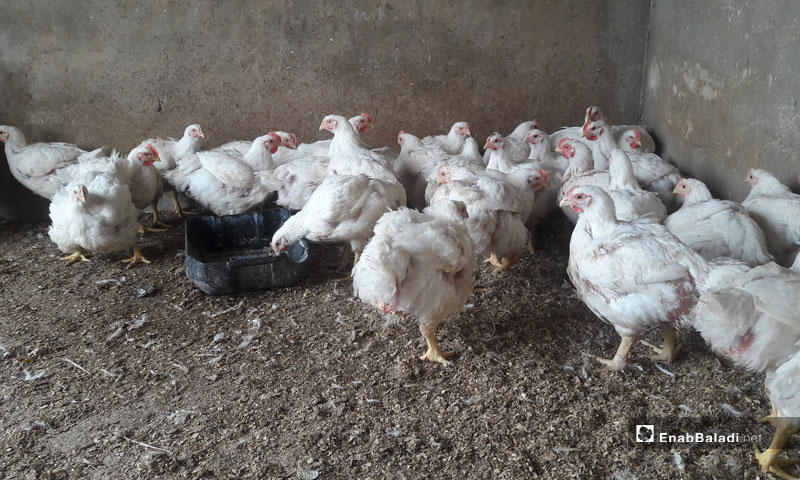



Enab Baladi– Daraa
Daraa Governorate, in southern Syria, has witnessed a significant increase in the prices of poultry and eggs since November 2019, as a result of the high costs of fodder and medicines imported from outside Syria, in addition to the absence of heating for poultry farms, which permanently exposes chicken to diseases and high rates of mortality.
As the prices of fodder and imported poultry increased respectively by 39.5 and 95 percent, in correlation with fluctuations in the exchange rate of the Syrian pound against the US dollar, in addition to the increase in the prices of poultry medicines by 50 percent according to the statements made by the Advisor to Syrian Federation of Agricultural Chambers, researcher Abdel Rahman Kronfila, to the government newspaper, al-Baath, on December 19, 2019.
These factors have led to doubling the prices of poultry and eggs. Enab Baladi reported that the price of one kilogram of chicken meat in slaughterhouses reached 1100 Syrian pounds, after amounting to 7000 Syrian pounds in the summer of 2019, while the price of an egg tray increased from 800 to 1500 Syrian pounds.
The high cost of production has led poultry farms’ owners to stop breeding chicken because they became unable to afford the production expenses. It is expected that the crisis will worsen in the coming months due to severe decease of poultry production during this period, which will lead to a shortage of poultry products in the market, while contributing to a constant increase of prices.
The head of the Daraa Poultry Breeders Committee, Wahib al-Miqdad, told Al-Baath on December 19, 2019, that more than two-thirds of poultry farmers in Daraa “abstained from breeding chickens during the winter.”
Al-Miqdad pointed out that the poultry breeder has endured major losses, as the production cost reached 950 Syrian pounds per kilogram while selling it for only 800 Syrian pounds.
A group of citizens in Daraa, who spoke on condition of anonymity, told Enab Baladi that chicken meat became a substitute for red meat, as the price of a kilogram of sheep meat reached 6000 Syrian pounds. However, with the rise of chicken meat prices, citizens became unable to buy it, too.
Abu Ammar, 35, considered that the increase of poultry prices made it extremely difficult for Syrians to add it to their grocery list, in light of the difficult economic conditions in Daraa.
Umm Alaa, from the Daraa countryside, told Enab Baladi that the high prices pushed citizens to buy poultry per piece rather than kilograms, considering that chicken meat had become a luxury for Syrian families.
Kronfila stated to Al-Baath newspaper that the solutions offered by the Syrian regime to stop the increase in prices revolved around granting interest-free loans to poultry farms’ owners, in conjunction with a reduction of 15 percent of the fees imposed on imported fodder, and liberating the prices of poultry and eggs for supply and demand in the local market.
Enab Baladi met with a number of slaughterhouse owners, who attributed the reason for the increase of poultry prices to the increase of fodder prices, as the price of one bag of fodder weighing 50 kg reached 20,000 Syrian pounds.
Slaughterhouse owners linked the high price of fodder to the low exchange rate of the Syrian pound against the dollar, and made it clear that “chicken fodder is indispensable” since any failure to feed chickens leads to decreasing its weight.
The slaughterhouse owners also talked about the impact of high fuel prices, diseases affecting chickens in the winter, and the high prices of poultry medicines, which are affected by the exchange rate of the Syrian pound to the dollar.
Slaughterhouse owners believed that the solutions lie in supporting poultry breeders with subsidized diesel, facilitating fodder and medicines import procedures, and preventing the exportation of chicken to neighboring countries.
The head of the Animal Production Department in Daraa, Walid Al-Masri, said in statements to the government newspaper Tishreen, on December 17, 2019, that the Syrian regime allocated 100 liters of fuel per month for every 5000 chickens. Thus, the allocations are distributed throughout the two-month production period for broiler chickens, and one year for laying hens.
Al-Masri referred to the “gradual recovery of the poultry sector”, as 350 poultry farms, out of 870, resumed their activities in Daraa. However, the Syrian citizens and owners of slaughterhouses are not optimistic about the situation, as they fear that the prices of other basic materials continue to rise.
if you think the article contain wrong information or you have additional details Send Correction